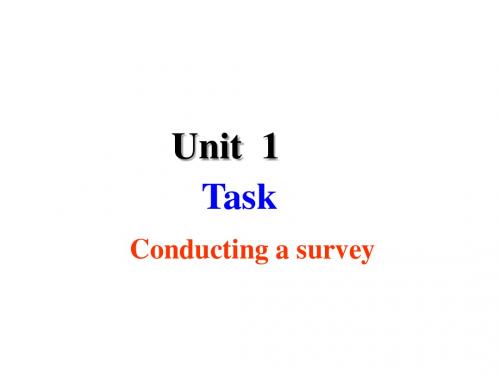高中译林牛津英语模块一Unit2Task
- 格式:ppt
- 大小:455.50 KB
- 文档页数:30






Unit 2 Growing painsPeriod 5 TaskSkills building 1: asking for and giving adviceTeaching aims:1.Teach students how to ask for and giving advice2.Improve their abilities of listening and speakingTeaching important points:Make sure students know how to ask for and give adviceTeaching methods:1.Listening-and-answering activities to help students practice asking for and givingadvice2.Individual, pair or group practiceTeaching procedures:Step one: Lead-inAsk the students how to ask for and give advice, then let them focus on the guidewords on page 32.Step two: Listening1.Ask students to listen to five people asking for advice. Make sure they understandwhat they are listening and they know what problems the five people are asking for advice.2.Ask them to listen again and complete the notes.3.Let them discuss whether they have the same problems and how to deal with theproblems,Step three: Listen to a radio phone-in program1.In this program, four teenagers call the host to talk about their problems and askfor advice. Students are asked to write down a proper name below each picture on page 33 according to what they ’ll learn from the tape.2.Listening3.Checking answers together.4.Picture description. ( form)Ask students to describe each picture according to the tape.Step four: ConsolidationIf possible, ask students to finish listening practice on page 100. Homework:1.Go over what they have learnt in this period.2.Preview Skill building two.Skills building 2: reading for the main pointTeaching aims:1. Provide students chances to develop reading skills by reading four diary entries.2. Help students to use reading skill to identify the main points of the four diary entries and tell some details in the letter asking for advice.Teaching Important and difficult points:Reading for the main pointTeaching method:Reading to get the main points of the reading materialTeaching procedures:Step One: Warming upGet students to read the instructions and know how to read for the main point. Catch the main point and Focus on descriptive words or expressions1.Read the four diary entries and fill in the form.Ask students to read four diary entries and underline the main points of each entry and circle the key words that show the mood of the writer. Ask students to finish the task in a group of four and each member of the group is in charge of one diary entry.2.read the diary entries again and answer:(1)Why did Christina call the radio show last week?(2)What advice did George give?(3)Did Christina follow his advice? What did she do?(4)How do they get on with each other?Step Three: Reading the letter asking for advice1. Get students to read the letter from Liu Zhen to an advice column in a magazine and answer the following questions:(1)Who wrote this letter?(2)To whom is the letter written? Why is the letter written?(3)What is the main idea of this letter?(4)Which words or expressions are used to make the main point?2. Ask students to finish answering the questions on page 35.3. Ask the students to discuss how many parts can this letter divided and point out the main point of each part.Finish reading exercises on page 98-99Step Five: DiscussionHave you ever had a problem with your parents similar to Liu Zhen’ s son?If so, who do you solve it?Homework:1. Finish the Ex on workbook.2 Review the words and expressions in this unit.Skills building 3: planning a letter of replyTeaching aims:1.To develop writing skills by reading the tips.2.Help students to improve their ability of writing a letter of advice correctly3.To understand the main point of the letter.Teaching Important and difficult points:Enable students to write a letter of advice in a correct way.Teaching method:Practicing to improve students’ writing skillTeaching procedures:Step One: Warming upT: Whenever we receive a letter asking for advice, it’s important to plan what we’re going to write.Some suggestions to help you in your planning:① Find the main points of the letter asking for advice②Answer each of these points directly③Do not give advice for points not discusses in the letter④ Offer comfort and support. Do not find fault with the person you are writing to.⑤Use modal verbs such as should or must, phrases such as make sure, or imperative to give your advice.1. Read the two letters, and discuss with partners which letter is better and why. Step Three: Reading the letter asking for advice1. Keep the tips in mind when making up and writing a letter of advice to Liu Xiaowei.2. Get the students to read the letter asking for advice and to get the main point of each paragraph. .3. Show the students a example of a letter of advice. Make sure they keep the suggestions in mind. Then ask the students to finish their own letter of advice.Step Four: ConsolidationPresent their letters to the whole class. They also can work in pairs to correct the mistakes in each other’s writing.Homework:Finish Workbook Writing.。